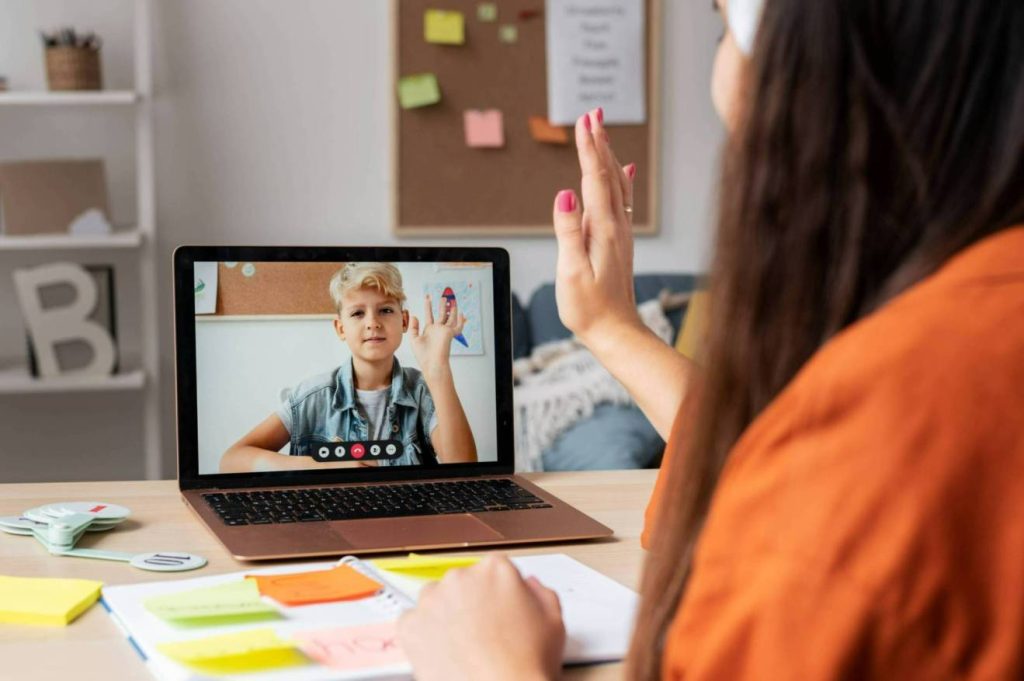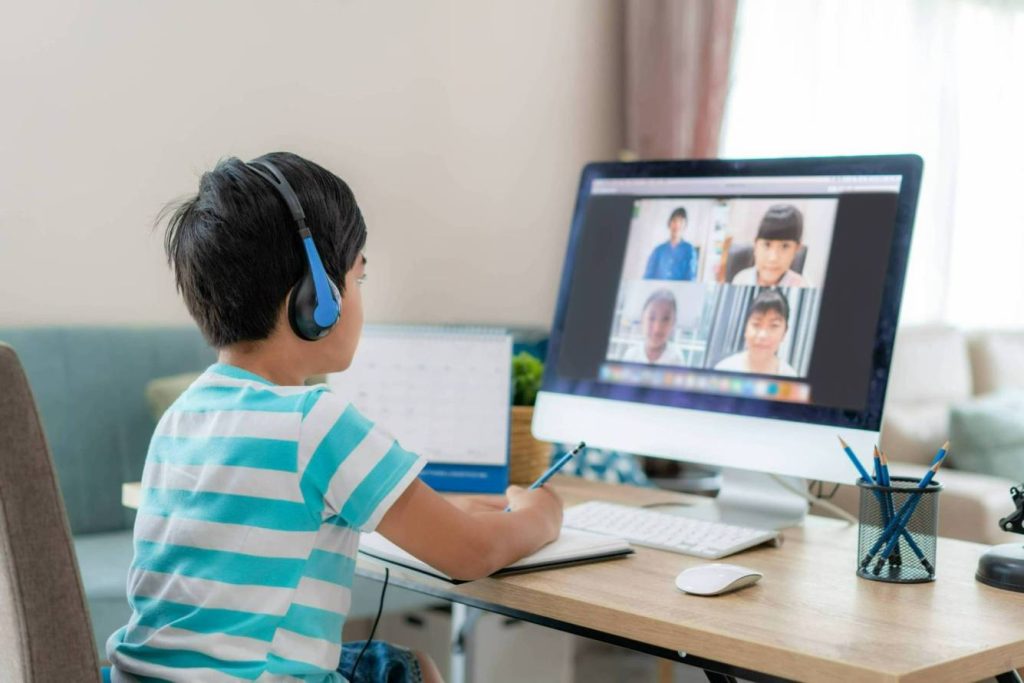
Building Student Confidence in the Classroom: Techniques Used by International Schooling Teachers
International Schooling Teachers play a vital role in boosting confidence in students and building self-esteem through a variety of strategies that create a supportive and empowering learning environment. By employing these techniques, teachers
Teachers of International Schooling play a vital role in boosting confidence in students and building self-esteem through a variety of strategies that create a supportive and empowering learning environment. By employing these techniques, teachers can foster a positive mindset, enhance self-belief, and encourage students to reach their full potential.
Not all kids feel secure or at ease in an online environment. Perhaps they are shy or feel uneasy watching themselves on a screen and taking part. Teachers must inspire learners' confidence and help them in building self-esteem.
Teachers At International Schooling
The method we select our teachers is a blatant example of the academic diversity and pluralism that characterize International Schooling. Every teacher is chosen through a meticulous, well-documented shortlisting procedure, and they all receive well-designed, in-depth training on our system.
To guarantee that every instructor is providing the best academic input, we have robust checks and balances in place. Input from parents and students is also recorded as part of a 360-degree feedback loop, and if necessary, the appropriate actions and improvements are taken. Every learner will receive a curated learning experience from us, one that respects their academic preferences as well as their parents and learners' cultural, racial, and traditional sensibilities
At International Schooling, thousands of students across the globe and nationalities are now being engaged by teachers across the world, making the entire learning paradigm a fully immersive and dynamic experience for every student.
Need for student building confidence
It's critical to comprehend the potential causes of students' difficulties before attempting various strategies in building self-esteem. Some learners may have trouble staying interested because of their turbulent home lives or other situations. Others could have a sense of loneliness and struggle to open up in a virtual classroom.
Every child is unique, of course! Teachers invest some time getting to know their students, preferably learning a little about their history. They start by giving a particular student the assistance they require after getting a clear grasp of why they might be having confidence issues. The child needs to be taught how to build self-esteem. According to an stats 70% of students agrees that online classes are better than traditional settings.
How Can a Teacher Instill Confidence in Their Students?
Let's go over a few techniques teachers employ to increase students' self-assurance in the virtual classroom and make learning a better experience for them.
1. Create a supportive and inclusive classroom environment
They establish a safe space where students feel comfortable expressing themselves and taking intellectual risks. Teachers promote respect, empathy, and appreciation for diversity, encouraging students to embrace their unique backgrounds and experiences. This inclusive atmosphere helps develop a sense of belonging and acceptance, which positively impacts student self-esteem.
2. Building strong teacher-student relationships

It is another key aspect of boosting students' confidence. International teachers invest time and effort into getting to know their students individually. They seek to understand their strengths, challenges, interests, and aspirations.
By demonstrating genuine care and interest, teachers create a trusting environment where students feel valued and supported. These positive relationships serve as a foundation for building confidence, as students feel more comfortable seeking help, sharing their ideas, and taking academic risks.
3. Optimize the learning environment
Establishing a welcoming and inspiring online classroom is one of the best things teachers do to increase student confidence and enhance the overall virtual learning experience. If teaching in person, educators would surely set up the classroom with engaging decorations. There shouldn't be any differences in an online learning environment.
As our teachers optimize the online learning environment, they employ the following tips:
- Avoid using busy or obtrusive backdrops
- Set boundaries with students
- Restrict the number of apps to be used in the classroom
- Encourage standing up and stretching during breaks.
4. Help them Control Their Anxiety
As a society, we frequently assume that stress and anxiety are problems that only adults face. Unfortunately, kids are just as prone to stress and may not be as equipped to handle it. If the teacher is worried about one of their students and thinks worry might be the cause of their lack of confidence, they should consider including stress-reduction strategies in the regular class routine.
They encourage the students to use all of their senses while also incorporating some of these strategies-
- Showing children calming images,
- Teaching them how to build confidence,
- Learn the tips on how to enhance self-esteem, how to improve your personality, and to be confident,
- Playing calming music or sounds during quiet time, or urging them to take a few deep breaths when they're feeling overwhelmed.
5. Providing constructive feedback and praise
It is an essential practice in boosting students' confidence. International teachers offer specific, actionable feedback that helps students understand their areas of improvement while also highlighting their strengths.
This feedback is focused not only on academic achievements but also on personal growth and character development. By acknowledging and praising students' efforts, progress, and achievements, teachers reinforce their self-belief and motivate them to continue striving for success.
6. Encourage active participation and collaboration among students
They create opportunities for students to engage in class discussions, group projects, and presentations. By actively involving students in the learning process, teachers help them develop confidence in their abilities to contribute meaningfully. Through participation and collaboration, students gain valuable interpersonal and communication skills while building confidence in expressing their ideas and viewpoints.
7. Encourage Social Interaction

In general, people have a deep-seated need to connect with others. The in-person connection is lost when students are in a virtual environment. It's not the same as engaging in person, even though most virtual classes allow students to use their cameras and see everyone's faces.
Some children and teenagers may experience self-consciousness as a result and struggle to muster the courage to speak up in class. By using various interaction techniques to increase everyone's comfort, teachers may encourage social connection electronically. Teachers try to do:
- The daily ice breaking session before the start of class,
- Voting and polling procedures,
- Breakout areas for small-group collaboration among students.
8. Setting attainable goals and celebrating successes
They guide students in setting realistic and achievable goals that align with their abilities and aspirations. By breaking down large tasks into smaller, manageable steps, teachers help students build confidence through a sense of accomplishment as they make progress.
Recognizing and celebrating both small and significant successes along the way reinforces students' belief in their capabilities and motivates them to continue striving for further achievements.
9. Encourage risk-taking and resilience in their students
They foster a growth mindset by emphasizing that mistakes and setbacks are natural parts of the learning process. Teachers provide support and guidance to help students learn from their failures and develop resilience. By encouraging students to view challenges as opportunities for growth and learning, teachers instill confidence in their ability to overcome obstacles and succeed.
10. Provide students with opportunities for leadership and responsibility
By assigning leadership roles, responsibilities, and decision-making opportunities within the classroom or school community, teachers demonstrate their confidence in students' abilities. This empowerment boosts students' self-assurance and belief in their capabilities, enabling them to develop essential leadership skills and take ownership of their learning.
Parent-Teacher Interactions at International Schooling
We provide both "Regular" and "On-Demand" parent-teacher exchanges. Discussions about specific worksheets or lesson plans could be part of these encounters. A powerful alliance between parents and teachers enables both parties to collaborate on the youngsters' learning.
In parent-teacher meet Teachers and parents can communicate in well to keep each other informed about the children's needs in terms of learning and behavior. Many parents are interested in talking about how their kids act after school. Additionally, they are interested in how their kids are handling their studies. The two parties' interactions result in a more favorable learning environment for the kids.
Conclusion
In summary, international schooling teachers employ a range of strategies to boost students' confidence. By creating a supportive and inclusive environment, building strong relationships, providing constructive feedback and praise, encouraging active participation and collaboration, setting attainable goals, celebrating successes, promoting risk-taking and resilience, and offering opportunities for leadership and responsibility, teachers empower students to believe in themselves and their abilities.
Show the learner the right pathway and teach them how to build confidence, how to build self-esteem! Through these efforts, teachers play a crucial role in nurturing students' confidence, enabling them to thrive academically, socially, and personally!
FAQs
What is the need to boost confidence in students?
Some students may struggle to maintain attention due to their chaotic home lives or other circumstances. It is a vital part of learning to build student self-esteem. Others could experience loneliness and find it difficult to communicate in a virtual classroom. Not all children are comfortable or feel safe in an online setting. They could be bashful or uncomfortable participating if they can see themselves on a screen. Teachers must instill confidence in their students.
How about the teachers at International Schooling?
Each teacher is selected through a thorough, well-documented shortlisting process, and they all go through methodical, in-depth training on our system. We have strong checks and balances in place to ensure that each instructor is giving the allocated learners the "best" academic input and assistance. International Schooling has well-trained teachers across the world teaching in all time zones.
How do teachers at International Schooling boost student confidence?
Through a variety of ways: By creating an inclusive environment, optimizing the virtual learning environment, helping in building confidence, providing students constructive feedback, helping the students with coping with anxiety, encouraging active participation and collaboration, encouraging the risk-taking factor in students, building self-esteem, and others.
Are there any parent-teacher interactions in International Schooling?
We offer both "Regular" and "On-Demand" parent-teacher interactions. Discussions about specific worksheets or lesson plans could be part of these meetings.
Suggested Read
- How To Create Ultimate Homeschool Planner That Really Works?
- Top 10 Homeschool Room Ideas To Stay Organized
- The pros and cons of homeschooling
- Helicopter Parenting: How Does It Impact Kids?
- Is Homeschooling a Trend? What expert thinks about homeschooling
- Surprising Benefits of Microlearning for Students
- Blended Learning: What Is It and How Does It Work?
- Online Classroom Management Techniques And Tips
- Top 10 Benefits of Online Learning That Will Change Your Mind
- Accreditation: Why It Matters When Choosing An Online School
Mira Lew
Aug 16, 2023



